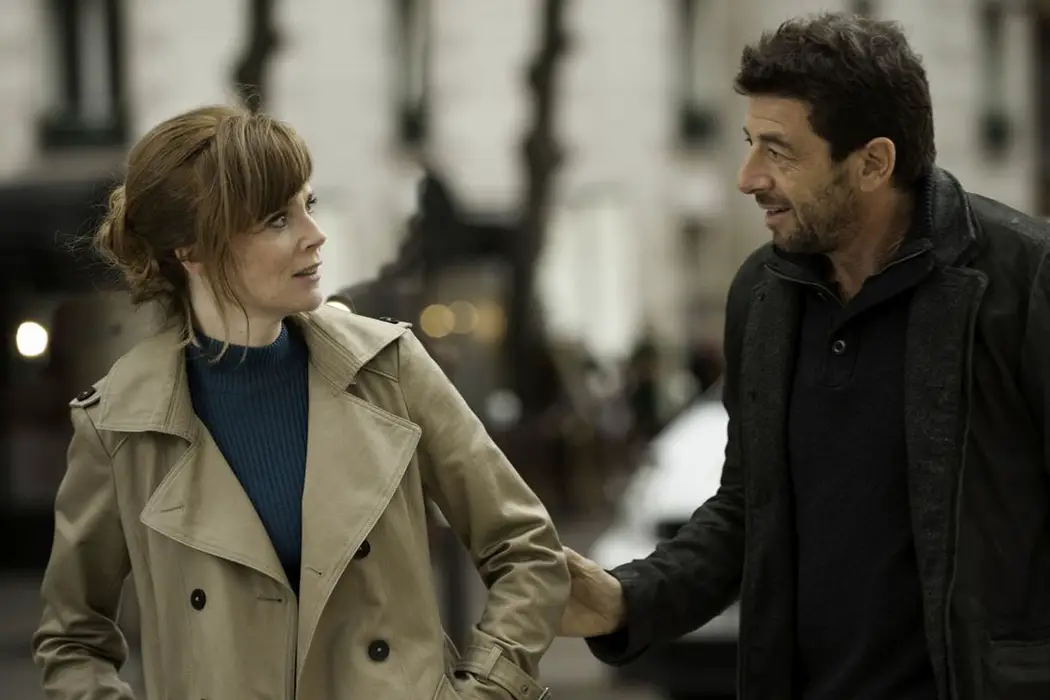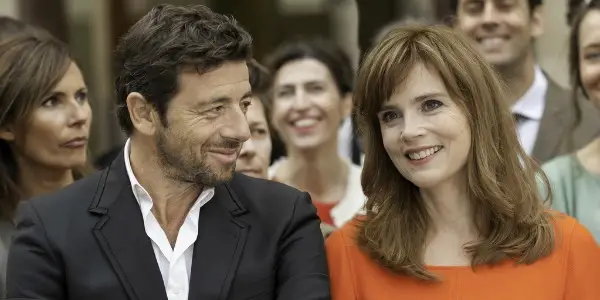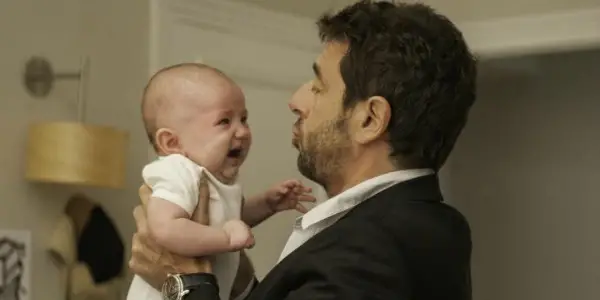LOVE AT FIRST CHILD: Sparklingly Generic

It took me a while to discover the wonderful world…
Love at First Child handily summarises itself in the very first scene; a sparkling Eiffel Tower watching over a busy Parisian night. We’ve seen this iconic image many, many times before, yet whilst it’s onscreen, it easily holds your attention.
There’s nothing new in this film. We’ve seen feuding couples turn into lovers, we’ve seen men comically struggle with raising babies, we’ve seen absent fathers grow to regret their absences. However, Love at First Child has an accomplished cast and enough comic moments to keep up your interest, which is particularly important considering the numerous twists and turns the story takes.
Plot
Gabrielle (Isabelle Carré), a middle-aged pharmacist, storms into the office of Ange (Patrick Bruel), a middle-aged architect, demanding that he talk to his son Simon (Thomas Solivérès) about supporting her daughter Claire (Alice de Lencquesaing), who he has just impregnated.
There are two things about this event that take Ange aback. Firstly, he has never met this woman before. Secondly, he was not aware he had a son. Although, considering the years he’s spent sleeping around, he does not find this second revelation all that surprising.

After a firm prod (and several slaps), from Gabrielle, Ange agrees to talk to Simon, the son he’s never met. Meanwhile, Gabrielle finds out that the conception of her granddaughter was not the accident that Claire had led everyone to believe.
As they deal with the varying difficulties their children’s looming parenthood brings, Ange and Gabrielle find themselves drawn to each other. Unfortunately, though, more challenges are never far away.
Ange And Gabrielle
A lacklustre script has been saved many a time by a dollop of chemistry between the names above the title, and this happens again with Love at First Child.
From the moment she flies into his office, it’s obvious that Carré and Bruel share a real spark. As is so often the case, this spark is brightest when they are fighting with each other. Though she is small, Gabrielle cuts an imposing figure. For the film’s first twenty minutes, Ange does everything she says, pretty much just because he’s scared of her.
One moment bugged me during those early scenes. Gabrielle has worn glasses up until the point she makes another unexpected entrance into Ange’s office, crying after discovering that her grandchild’s growth appears to be stunted (this is soon revealed to be a false alarm). Ange tenderly removes her glasses, so she can wipe her eyes. As he later hands them back he says “You look good without glasses. You look lost, fragile.”
Women suddenly losing their glasses and becoming beautiful is an infuriating, decades old trope, famously disproved in How To Marry A Millionaire (released in 1953!). And for Ange to equate a woman looking ‘fragile’ with looking ‘good’ is a little creepy.
Though it’s only a small, seemingly inconsequential line, Gabrielle’s character is different after this scene, and throughout the rest of the film. Whilst she doesn’t exactly become a dormouse, she is never again as fabulously assertive as she is in those opening sequences. And though she does wear her glasses a couple more times before the end credits, she never does so in the presence of Ange.
This is not the first time at the romantic comedy rodeo for either Isabelle Carré or Patrick Bruel, however, and even when writer/director Anne Giafferi’s script lets them down, they easily keep the charm flowing.
Thematically Thin
Romantic comedies are not known for their in-depth, incisive exploration of hot button issues, and Love at First Child is certainly not going to change that. Nevertheless, considering the thematically fertile ground that the film does cover, it’s a shame how shallow the treatment is of the various topics that arise.
The film deals with abandonment issues aplenty. The only case that gets any real attention is Ange’s abandonment of Simon (though whether you can abandon a child you didn’t know you had is questionable). There’s also the abandonment of Claire’s father, and the (temporary) abandonment of baby Louise by Claire, both instances which are barely grazed by this profoundly incurious screenplay.

And these multiple instances of abandonment raise further areas of potential inquiry. Subjects like responsibility, the sins of the father and the subsequent feelings of inadequacy all threaten to make an appearance. But if they are mentioned at all, it’s only in passing.
Teen motherhood too, goes unexamined. Claire wants a baby so much that she’s willing to use (to put it kindly), dishonest means to make that happen. She never really gives an explanation why. Her character could have been so much richer if Giafferi had dug a little into her motivations.
Again, this is clearly a romantic comedy, and a light one at that, so we were never going to get comprehensive looks at all of these topics. To ignore them at the level of Love at First Child, however, is disappointing and a tad lazy.
Comedy
Love At First Child is at its best when dealing with comedy. Not every joke lands, but most do.
The film finds a lot of humour from the uselessness of (some) men around babies. Ange and Simon babysit whilst Gabrielle attempts to retrieve an AWOL Claire. Both men initially hold baby Louise like she is made of nitro-glycerine. An explosive nappy leads to them washing her over the kitchen sink; squirting washing up liquid at the soiled area, and wiping her down with a dishcloth.

Ange’s hypochondria is also played for laughs. And that hypochondria doesn’t just extend to himself. When Gabrielle sends him a photo of his new granddaughter, he inquires ‘Which way up is she?’ His nice gesture of sending flowers to the new mother is undercut by his message on the card; ‘Did you ask the doctor if the baby’s normal? She looks odd to me.’
There are no big comedic set pieces, and the film could hardly be described as riotous. Yet it’s rare that five minutes pass without eliciting a smile.
Conclusion
There’s not a single element of Love at First Child that you haven’t seen before. Nothing surprising, no new insight, nothing remarkable. However, an enjoyable rapport between our leading couple, and some well-played comedic moments make the film a pleasant viewing experience.
There’ve been better romantic-comedies. There’ve been worse. Love at First Child is not a film you’ll remember the week after you’ve watched it, but it’s a nice enough way to pass the time.
What’s your favourite French romantic-comedy? And your least favourite?
Love At First Child releases on VOD on 11 July. For all upcoming release dates of Love at First Child, click here.
Does content like this matter to you?
Become a Member and support film journalism. Unlock access to all of Film Inquiry`s great articles. Join a community of like-minded readers who are passionate about cinema - get access to our private members Network, give back to independent filmmakers, and more.
It took me a while to discover the wonderful world of cinema, but once I did, everything just fell into place.












